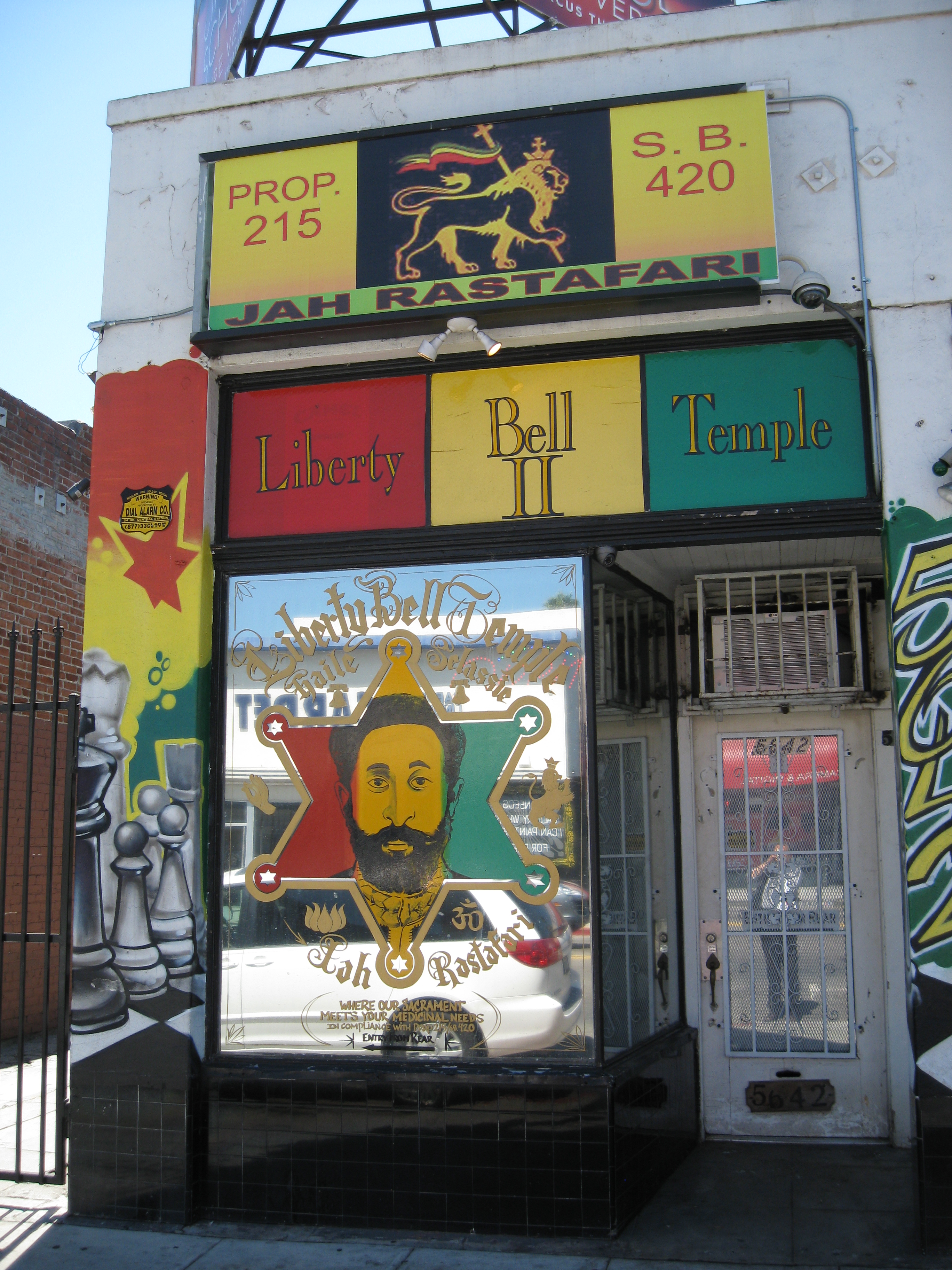|
Ital
Ital, also spelled I-tal (), is food often celebrated by those in the Rastafari movement. It is compulsory in the Bobo Ashanti and Nyabinghi mansions, though not in the Twelve Tribes of Israel. The word derives from the English word "vital", with the initial "v" removed. This emphasis on the letter "I" is done to many words in the Rastafari vocabulary to signify the unity of the speaker with God and all of nature. The expression of Ital eating varies widely from Rasta to Rasta, and there are few universal rules of Ital living. The primary goal of adhering to an Ital diet is to increase liveliness. The life energy that Rastafari generally believe lives within all human beings, as conferred from the Almighty, is referred to as Livity. A common tenet of Rastafari beliefs is the sharing of a central Livity among living things, and what is put into one's body should enhance Livity rather than reduce it. Though there are different interpretations of ital regarding specific foo ... [...More Info...] [...Related Items...] OR: [Wikipedia] [Google] [Baidu] |
Rastafari Movement
Rastafari is an Abrahamic religion that developed in Jamaica during the 1930s. It is classified as both a new religious movement and a social movement by scholars of religion. There is no central authority in control of the movement and much diversity exists among practitioners, who are known as Rastafari, Rastafarians, or Rastas. Rastafari beliefs are based on an interpretation of the Bible. Central to the religion is a monotheistic belief in a single God, referred to as Jah, who partially resides within each individual. Rastas accord key importance to Haile Selassie, Emperor of Ethiopia between 1930 and 1974, who is regarded variously as the Second Coming of Jesus, Jah incarnate, or a human prophet. Rastafari is Afrocentric and focuses attention on the African diaspora, which it believes is oppressed within Western society, or "Babylon". Many Rastas call for this diaspora's resettlement in Africa, a continent they consider the Promised Land, or "Zion". Rastas refer to t ... [...More Info...] [...Related Items...] OR: [Wikipedia] [Google] [Baidu] |
Rastafari
Rastafari is an Abrahamic religions, Abrahamic religion that developed in Jamaica during the 1930s. It is classified as both a new religious movement and a social movement by Religious studies, scholars of religion. There is no central authority in control of the movement and much diversity exists among practitioners, who are known as Rastafari, Rastafarians, or Rastas. Rastafari beliefs are based on an interpretation of the Bible. Central to the religion is a monotheistic belief in a single God, referred to as Jah, who Immanence, partially resides within each individual. Rastas accord key importance to Haile Selassie, Emperor of Ethiopia between 1930 and 1974, who is regarded variously as the Second Coming of Christ, Second Coming of Jesus, Incarnation, Jah incarnate, or a human prophet. Rastafari is Afrocentrism, Afrocentric and focuses attention on the African diaspora, which it believes is oppressed within Western society, or "Babylon". Many Rastas call for this diaspora's ... [...More Info...] [...Related Items...] OR: [Wikipedia] [Google] [Baidu] |
Pescetarianism
Pescetarianism ( ; sometimes spelled pescatarianism) is a dietary practice in which seafood is the only source of meat in an otherwise vegetarian diet. The inclusion of other animal products, such as eggs and dairy, is optional. According to research conducted from 2017 to 2018, approximately 3% of adults worldwide are pescetarian. Definition and etymology "Pescetarian" is a neologism formed as a portmanteau of the Italian word " pesce" ("fish") and the English word "vegetarian". The term was coined in the United Kingdom in the late 1980s. "Pesco-vegetarian" is a synonymous term that is seldom used outside of academic research, but it has sometimes appeared in other American publications and literature since at least 1980. History Early history The first vegetarians in written western history may have been the Pythagoreans, a title derived from the Greek philosopher Pythagoras. Though Pythagoras loaned his name to the meatless diet, some biographers suspect he may hav ... [...More Info...] [...Related Items...] OR: [Wikipedia] [Google] [Baidu] |
Vegetarianism
Vegetarianism is the practice of abstaining from the Eating, consumption of meat (red meat, poultry, seafood, insects as food, insects, and the flesh of any other animal). It may also include abstaining from eating all by-products of animal slaughter. A person who practices vegetarianism is known as a vegetarian. Vegetarianism may be adopted for various reasons. Many people ethics of eating meat, object to eating meat out of respect for Sentience, sentient animal life. Such ethical motivations have been codified vegetarianism and religion, under various religious beliefs as well as animal rights advocacy. Other motivations for vegetarianism are health-related, political, Environmental vegetarianism, environmental, cultural, aesthetic, Economic vegetarianism, economic, gastronomy, taste-related, or relate to other personality psychology, personal preferences. A small number of towns and cities around the world are exclusively vegetarian or have outlawed meat, including Rishikesh ... [...More Info...] [...Related Items...] OR: [Wikipedia] [Google] [Baidu] |
Dreadlocks
Dreadlocks, also known as dreads or locs, are a Hairstyle, hairstyle made of rope-like strands of matted hair. Dreadlocks can form naturally in Hair#Texture, very curly hair, or they can be created with techniques like twisting, Backcombing, backcombing, or crochet. Etymology The word ''dreadlocks'' is usually understood to come from Jamaican Creole ''dread'', "member of the Rastafari, Rastafarian movement who wears his hair in dreadlocks" (compare Nazirite), referring to their fear of God, dread or awe of God. An older name for dreadlocks was ''Wiktionary:elflock, elflocks'', from the notion that elf, elves had matted the locks in people's sleep. Other origins have been proposed. Some authors trace the term to the Mau Mau rebellion, Mau Mau, a group of whom apparently coined it from British Empire, British colonialists in 1959 as a reference to their dreadful hair. In their 2014 book ''Hair Story: Untangling the Roots of Black Hair in America'', Ayana Byrd and Lori Tharps cl ... [...More Info...] [...Related Items...] OR: [Wikipedia] [Google] [Baidu] |
Veganism
Veganism is the practice of abstaining from the use of animal products and the consumption of animal source foods, and an associated philosophy that rejects the commodity status of animals. A person who practices veganism is known as a vegan. The foundations of veganism include ethical, moral, environmental, health and humanitarian arguments. Strict veganism excludes all forms of #Animal use, animal use, whether in agriculture for labour or food (e.g., meat, fish and other animal seafood, eggs, dairy products such as milk or cheese, and honey), in clothing and industry (e.g., leather, wool, fur, and some cosmetics), in entertainment (e.g., zoos, exotic pets, and circuses), or in services (e.g., guide dogs, police dogs, hunting dogs, working animals, and animal testing, including medical experimentation and the use of pharmaceuticals derived from or tested on animals). A person who practices veganism may do so for personal health benefits or to reduce animal deaths, minimize ... [...More Info...] [...Related Items...] OR: [Wikipedia] [Google] [Baidu] |
Hindu
Hindus (; ; also known as Sanātanīs) are people who religiously adhere to Hinduism, also known by its endonym Sanātana Dharma. Jeffery D. Long (2007), A Vision for Hinduism, IB Tauris, , pp. 35–37 Historically, the term has also been used as a geographical, cultural, and later religious identifier for people living in the Indian subcontinent. It is assumed that the term ''"Hindu"'' traces back to Avestan scripture Vendidad which refers to land of seven rivers as Hapta Hendu which itself is a cognate to Sanskrit term ''Sapta Sindhuḥ''. (The term ''Sapta Sindhuḥ'' is mentioned in Rig Veda and refers to a North western Indian region of seven rivers and to India as a whole.) The Greek cognates of the same terms are "''Indus''" (for the river) and "''India''" (for the land of the river). Likewise the Hebrew cognate ''hōd-dū'' refers to India mentioned in Hebrew BibleEsther 1:1. The term "''Hindu''" also implied a geographic, ethnic or cultural identifier for ... [...More Info...] [...Related Items...] OR: [Wikipedia] [Google] [Baidu] |
Nyabinghi (Mansion Of Rastafari)
Nyabingi is one of the oldest denominations, or "Orders", of the Rastafari movement. Probably the largest Rastafari group, the House of Nyabingi is an aggregate of more traditional and militant Rastas who seek to retain the movement close to the way in which it existed during the 1940s. They stress the idea that Haile Selassie was Jah and the second coming of Jesus. It was founded by Rastafari elders such as Ras Boanerges, Bredda Authur and others. The name was supposedly taken from a legendary Rwandan, Ugandan, or Tanzanian woman whose name is said to mean "she who possesses many things". This woman's name later inspired the Nyabingi rebellion movement that began in Uganda. Some people think this name was later taken by some members of the Rastafari movement and was used to create a current frame of thought. This name, Niyabingi, was actually mainly attributed to the prisoners across the continent of Africa and later groups of people in Jamaica (mainly from Pinnacle, the Ra ... [...More Info...] [...Related Items...] OR: [Wikipedia] [Google] [Baidu] |
Rastafari Vocabulary
Iyaric, also called Dread Talk or Rasta Talk, is a form of language constructed by members of the Rastafari movement through alteration of vocabulary. When Africans were taken into captivity as a part of the slave trade, English was imposed as a colonial language. In defiance, the Rastafari movement created a modified English vocabulary and dialect, with the aim of liberating their language from its history as a tool of colonial oppression. This is accomplished by avoiding sounds and words with negative connotations, such as "back", and changing them to positive ones. Iyaric sometimes also plays a liturgical role among Rastas, in addition to Amharic and Ge'ez. Features Phonology Iyaric shares phonological features with Jamaican Creole, with certain sounds, such as /a/, being stressed for the purpose of group identification distinct from Jamaican Creole. In 2015, Doctor of linguistics Havenol M. Schrenk adapted a phoneme inventory from the President Emeritus of the Interna ... [...More Info...] [...Related Items...] OR: [Wikipedia] [Google] [Baidu] |
Salt
In common usage, salt is a mineral composed primarily of sodium chloride (NaCl). When used in food, especially in granulated form, it is more formally called table salt. In the form of a natural crystalline mineral, salt is also known as rock salt or halite. Salt is essential for life in general (being the source of the essential dietary minerals sodium and chlorine), and saltiness is one of the basic human tastes. Salt is one of the oldest and most ubiquitous food seasonings, and is known to uniformly improve the taste perception of food. Salting, brining, and pickling are ancient and important methods of food preservation. Some of the earliest evidence of salt processing dates to around 6000 BC, when people living in the area of present-day Romania boiled spring water to extract salts; a salt works in China dates to approximately the same period. Salt was prized by the ancient Hebrews, Greeks, Romans, Byzantines, Hittites, Egyptians, and Indians. Salt became a ... [...More Info...] [...Related Items...] OR: [Wikipedia] [Google] [Baidu] |
Cigarettes
A cigarette is a narrow cylinder containing a combustible material, typically tobacco, that is rolled into thin paper for smoking. The cigarette is ignited at one end, causing it to smolder; the resulting smoke is orally inhaled via the opposite end. Cigarette smoking is the most common method of tobacco consumption. The term ''cigarette'', as commonly used, refers to a tobacco cigarette, but the word is sometimes used to refer to other substances, such as a cannabis cigarette or a herbal cigarette. A cigarette is distinguished from a cigar by its usually smaller size, use of processed leaf, different smoking method, and paper wrapping, which is typically white. There are significant negative health effects from smoking cigarettes such as cancer, chronic obstructive pulmonary disease (COPD), heart disease, birth defects, and other health problems relating to nearly every organ of the body. Most modern cigarettes are filtered, although this does not make the smoke inhaled f ... [...More Info...] [...Related Items...] OR: [Wikipedia] [Google] [Baidu] |







